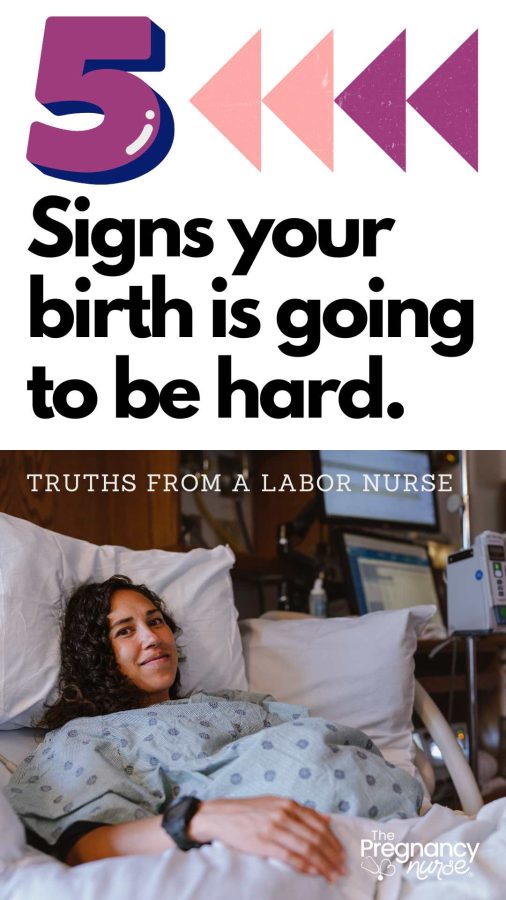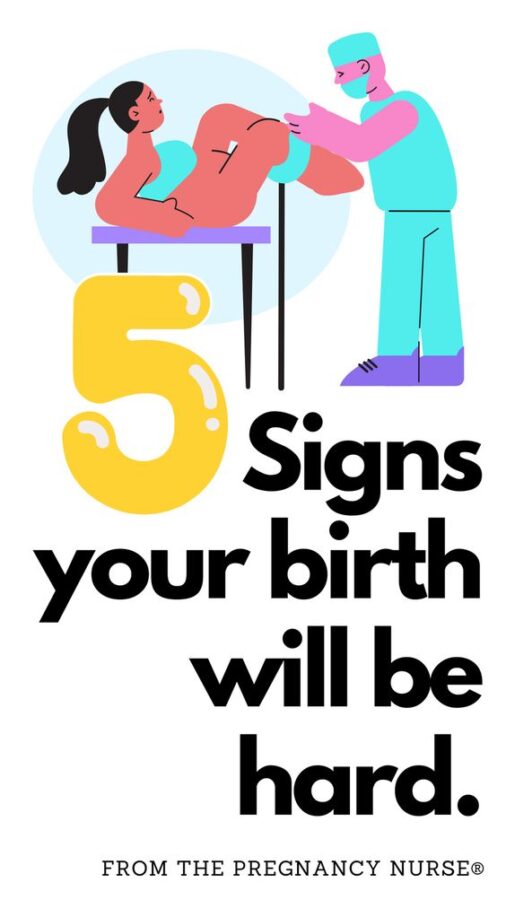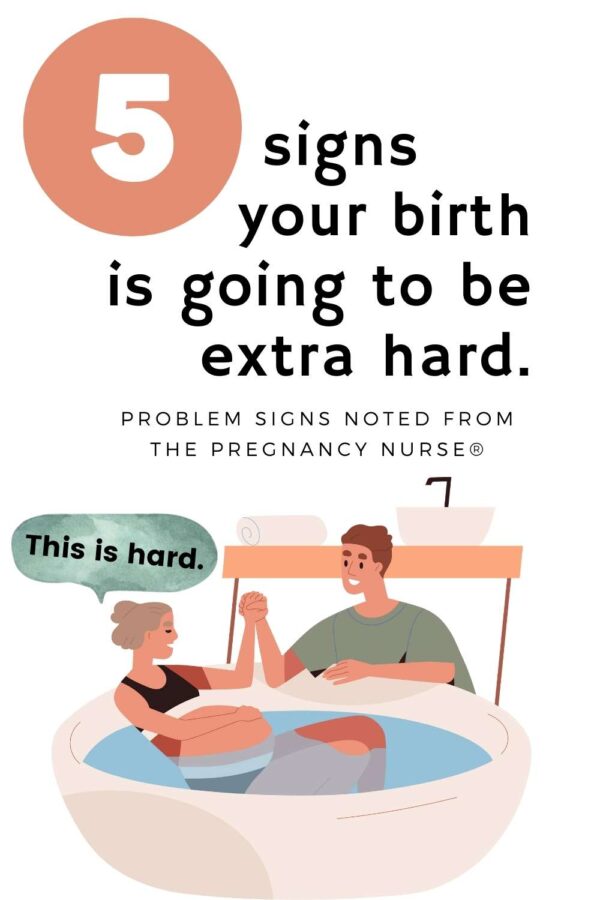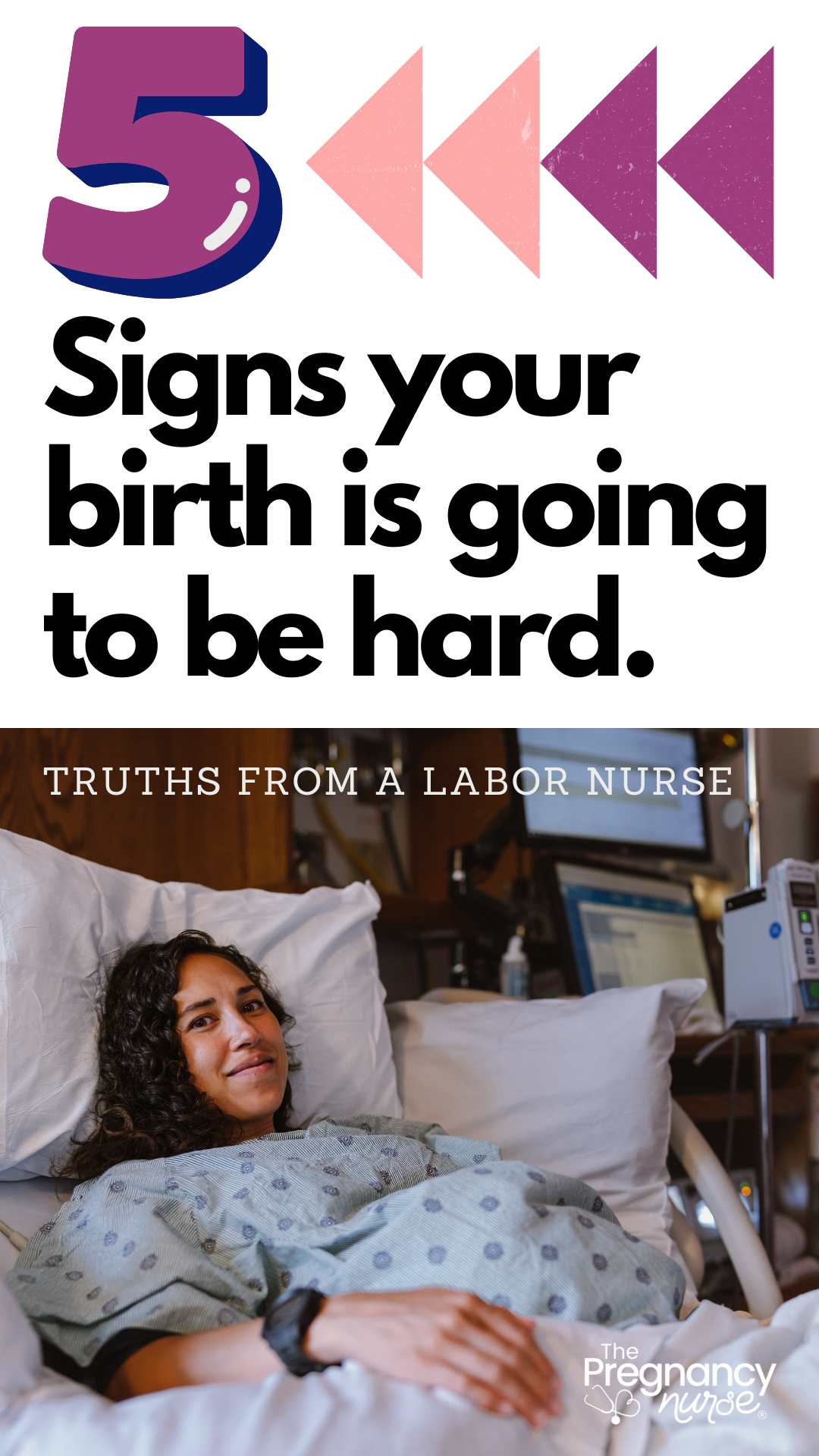Today I want to tell you five things to watch for your birth to be hard. These are things that can be fixed, but you need to be aware of them.
Be SURE to read til’ #5 — because it’s the one you have the most control over!

While you’re here, grab my third trimester checklists:
Ok, let’s talk about reasons your birth will likely be harder than otherwise:
1 – You Don’t Like Your Doctor
Don’t worry — I’m going to give you some tips on what to do if this is you — but first, let’s figure out your actual problem:
Now, not liking your doctor can fall into one of two camps:
- They are a jerk, but a great doctor
- They are a jerk and also a horrible doctor
Now, as a nurse I’ve seen a LOT of doctors fall into that first camp. Many people that specialize in specific things (aka, neurosurgery or cardiology) just are so into the data and the work they forget to be good humans (although many when pushed actually are — it just doesn’t come naturally to them).
However, those are the doctors I want on my side when the chips are down.
The reality is that a doctor in labor often doesn’t really matter (which is why homebirth has great results — honestly, you could birth alone a great majority of the time and be really fine — you just never know if your birth will be the problem one).
However, things can go wrong — like really wrong. Then you need a skilled artisan at their work. And those artisans are sometimes just really poor at people skills. Unfortunately. That isn’t to say that you can’t find a doctor that is both, but I think sometimes the general population just doesn’t understand this.
Pro Tip: Some of the “nicest” doctors (per patients) are the absolute WORST in their practice. Just something nurses know, that other people don’t know. You’ve gotta be mindful of their “niceness” and if they’re doing things you don’t want with a big smile on their faces…..

Ok, so you don’t like your doctor. I’ll agree that this is an issue. What can you do about it?
If you’re Before 30 Weeks: Get a new provider. Prior to 30 weeks it’s pretty easy to change providers. Ask friends, ask in community groups on social media and then compare them with your insurance options to see some good ones to try. You can always try calling their office to get a “vibe” (although this also doesn’t always work).
Some of my favorite doctors have absolutely HORRIBLE offices. I purposely don’t go to them because of that issue. However, sometimes it’s worth it — especially if you’re pregnant. You just know managing your appointments will take a bit more effort. However, if it’s making you not want to go to your appointments, it might be worth it to change.
If you’re after 30 weeks: You can still try to get a new provider but some offices won’t accept patients as they get closer to their due date (for a variety of reasons). I’d ask around, and call a few on your insurance plan to see if you can change.
** I am finding this to be less of an issue lately, especially in larger practices — they are often still willing to take you. Just know it will require a bit more leg work on your end.
Here’s a few other posts about providers that might interest you:
- Breaking Up with your OB (or any doctor)
- What to Do When You Disagree With Your Doctor
- How To Ask Your Doctor To Induce You
- 3 Things To Do When Your Doctor Says You Have A Big Baby
- How Often Do Your Go To The Doctor When Pregnant?
However, no matter what you do — if you don’t love your doctor it’s EXTRA important to follow #5…. so keep reading.
But first, we’re going to talk about something not a lot of people think about…
2 – Previous Uterine or Cervical Surgery
When you have a biopsy (or a c-section) sometimes they don’t mention that that surgery can hurt your chances towards having a vaginal birth. This can include cervical biopsies (often called a cone biopsy) for an issue on your pap smear.
Uterine surgery can weaken the uterine walls and can cause labor to be more dangerous. Because of this we have to monitor you more closely and we will recommend a few more precautions when you are in labor.
Cervical surgery can leave a scar on your cervix that can prevent it from opening. Sometimes it just has to stretch, but sometimes it really complicates things.
There are specific types of uterine surgery (usually if you have a scar that is vertical vs horizontal) that are a contraindication to a vaginal birth and they will recommend a C-section because the uterus is MUCH more likely to pop-open (called uterine rupture) at those incisions.
Pro Tip: Most incisions in the US are done horizontally, which allows a better chance of having a vaginal birth with your next pregnancy (VBAC or TOLAC). And, just because your incision on your skin is horizontal, that doesn’t mean the UTERINE incision was done that way as well — so it’s important to know.
If a C-section is in your past (or your future) check out a few of these posts:
- Tips if You Are Afraid of a Cesarean
- Having a Positive Cesarean Experience with My Friend Rachel
- Preparing for an Unexpected Cesarean with Katy
- How To Prepare For Your C-Section (Cesarean Section)
- Cesarean Section Anesthesia
While you’re here, don’t forget to pack that bag:
Ok, let’s go back to something you can change:
3 – You Aren’t Your Best Advocate
Learning how to get the information you need from your provider and then firmly making your choice known is one of the best things you can learn to do as a human being. This will be a skill that will come in handy as you have pediatricians, other health issues in your life — so, learning it now can be a BIG help.
Some things you can say as you’re gathering information for yourself:
- Are there any other alternatives to this plan? (there are ALWAYS alternatives, never let them say there aren’t — waiting is always an alternative)
- Ok, that seem to be what you recommend, but can I ask what else we could try?
- Are the baby and I doing OK right now — what would happen if we waited?
If your provider is insistent that you do something their way you can say. I understand that XYZ is a risk, but I really feel better waiting for a bit. Please let me know if see other issues arise.
I encourage you to start this ASAP — no matter how many weeks you are— ask questions that pop into your head during appointments, begin conversations on easy things like the best prenatal vitamin so when you get to harder choices like if you should have an induction, you’re used to it.
Mostly what you want them to know is that you’ve heard the reasoning behind their viewpoint, and have decided to do something different. So often in medicine we worry that you don’t understand what we’re saying and are just going by something you saw on social media — so when you help us see you understand it helps us feel more comfortable that we’ve really helped educate you.
A bonus thing to do is to say why you want to wait. or do it differently. For instance, if they want to check your cervix but you’d prefer they didn’t you can say that it is really uncomfortable because of previous trauma you’ve had so you’d like to limit it.
You can imagine that makes a lot more sense to use then someone who just says “no, I don’t want that.” It also helps us tailor your care for you throughout your pregnancy. Communication is key!

4 – High Expectations
This is a tough one. I’m a huge fan of birth plans — but most people use them in the wrong way. Let me show you what I’ve found to be the most effective way to make/use a birth plan:
Cliff notes: the idea is to think more about what you’d like (in a perfect world) rather than what WILL happen at your birth.
Far too often, we have a picture in our head about how labor, birth or life with baby will look like — and when the reality isn’t like that, we feel let down.
When we just hope that things will be OK and that we’re ready to go with the flow of how things will look for us, we have a MUCH better time (at both birth and parenting I find).
Having low expectations of how things will turn out (but having hopes and being prepared) is a good plan for the rest of parenting, take my word for it.
Here are a few other posts on good birth plan mindsets:
- Birth Plan Worksheet: Flexible Birth Plan for Success!
- What a Birth Plan can Do For You
- Birthing Plan: What Does Your Labor Nurse Think?
- I’m So Nervous About Birth – What Do I Do?
And finally, something that will both help you with the reality of the situation, and something you have a lot of control over….
5 – You’re Not Prepared
Not being prepared for birth is probably the biggest one here, and honestly — one of the ones you have the most control over.
Studies show that those who take a birth class have:
- Decreased cesarean sections
- Decreased induction
- Less epidurals
- Less assisted births (forceps or vacuum)
They also show that they have a better birth experience over all.
The bad news is that most birth classes cover sort of the “biology of birth” — which is nice, but doesn’t really prepare you to face many of the unplanned events of pregnancy.
I know for my own birth they showed me what labor, postpartum and breastfeeding would look like in a perfect world, but when I needed forceps, tore a lot and breastfeeding didn’t go according to “plan” it didn’t help me prepare at all.
I recommend this birth class to actually prepare you.
Why that one? People feel about 70% more prepared (seriously, they study it — and make adjustments to make sure it’s “working”) after the class, because the teacher takes it really seriously and has entire chapters on inductions, cesareans and how to talk with your birth time when things aren’t going “per the usual”.
Honestly, one of the hardest parts of birth is when things feel out of control and you have no idea what’s going on. Yes, that can be helped with a good provider (although, you can’t be sure who’s going to be on the day you delivery), a healthy body, and good communication skills — but truly preparing you will not only help you feel in control, but also set your expectations appropriately.
Honestly, I love that we do have some control over these types of situations. It’s tough that most people don’t take the time to get prepared though.
I also have a video of this post in case you want to dive in more with me:
And, with that I wish you the very best birth. By communicating well, setting expectations correctly and getting prepared I think you’ll have just that!









 How is Cytotec (Misoprostol) Given for Labor Induction?
How is Cytotec (Misoprostol) Given for Labor Induction?
